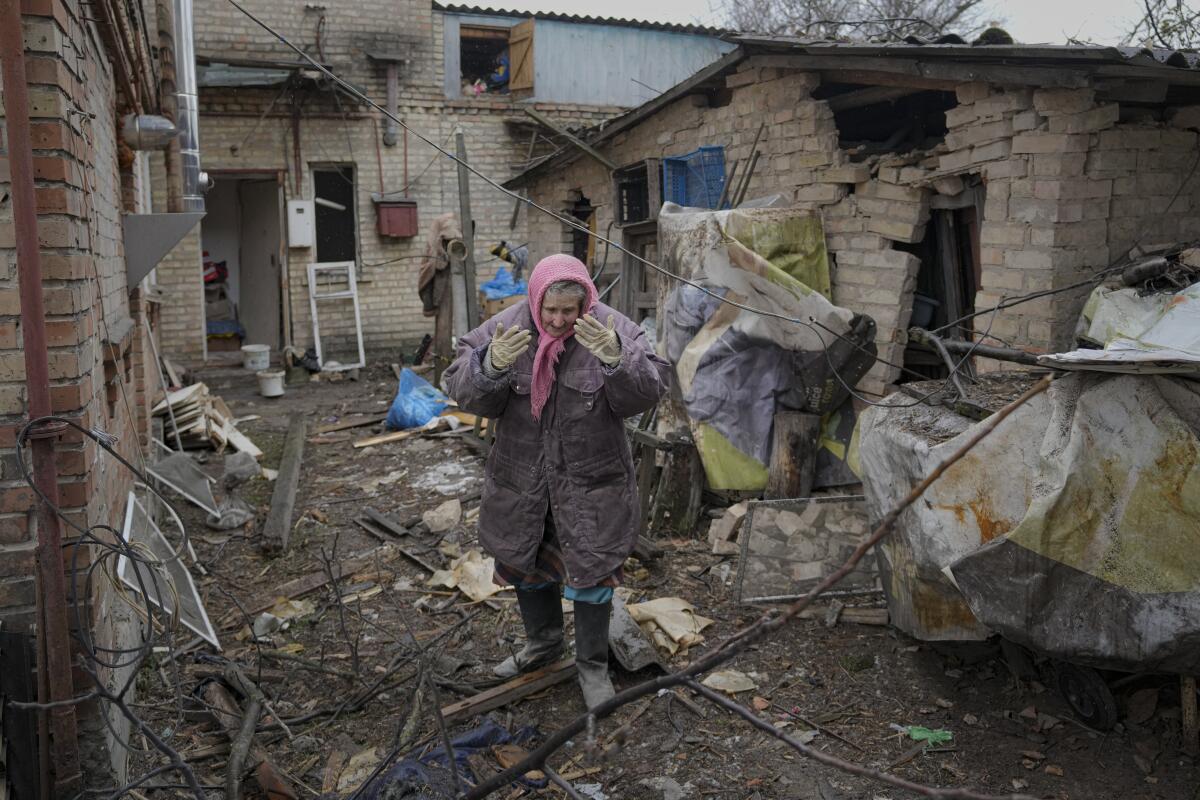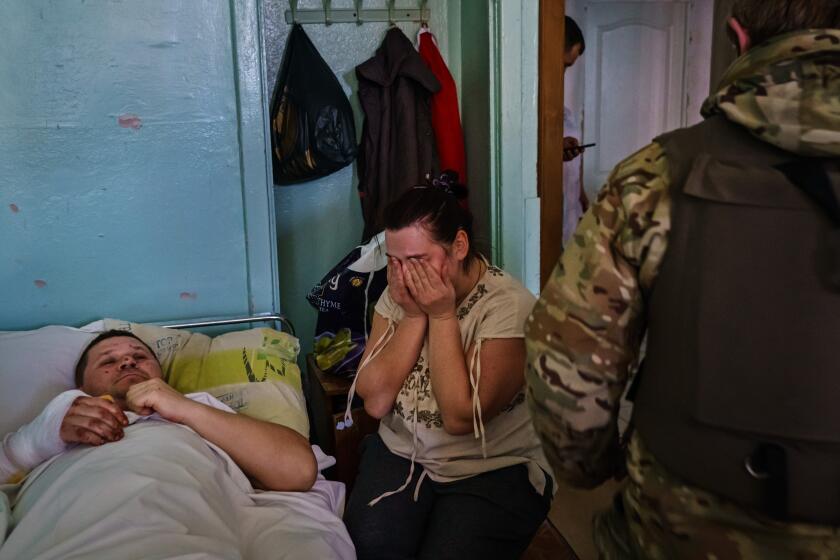Column: Biden says he’ll keep us out of this war. But history suggests that won’t be easy

- Share via
War has a life of its own. It spins out of control, confounding the plans, hopes and expectations of those who are engaged in it.
Military strategists have spent lifetimes trying to tame it. But the study of war is still to a great degree the study of uncertainty, misunderstanding, missed opportunity and unforeseen consequences. History books offer countless stories of accidental wars and steadily deepening conflicts whose leaders wonder in retrospect how things got so out of hand.
“It’s very easy to start a war, but once it’s underway, it gets harder and harder to stop,” says Karl Mueller, a defense analyst at Rand Corp. “Getting out is more difficult than getting in.”
Opinion Columnist
Nicholas Goldberg
Nicholas Goldberg served 11 years as editor of the editorial page and is a former editor of the Op-Ed page and Sunday Opinion section.
It’s all very well that President Biden and his European allies have repeatedly assured us they have absolutely no intention of getting involved in a direct military confrontation with nuclear-armed Russia.
But, frankly, it’s not so difficult to see that promise being swept aside in the face of unexpected pressures and changing circumstances. It’s not hard to imagine the war in Ukraine careening off in ever more dangerous directions.
Among the wars that have escalated in unanticipated ways are the American Revolution, the War of 1812, the Civil War, both world wars, Korea and Vietnam, according to one Rand study.
During World War I, for instance, Germany’s plan to invade France required it to invade Belgium as well, which triggered treaty-bound Britain’s entry into the conflict in August 1914.
In World War II, a small group of German bombers accidentally attacked London in August 1940. In retaliation, the Royal Air Force launched its first raid against Berlin, which in turn contributed to the German decision to begin the Blitz, the concerted bombing campaign of 1940-41.
That’s how escalation works.
Officials assess grim toll at Mariupol maternity hospital after Russian and Ukrainian officials fail to make progress after meeting in Turkey.
Sometimes it is intentional, according to military strategists. One side purposely heightens the conflict because it calculates that the price it will pay is worth it.
Sometimes it is inadvertent, as some say was the case in the invasion of Belgium, which came at a time when the Germans were eager to keep Britain out of the war.
And in some cases it is purely accidental. An errant plane mistakenly flies into enemy airspace and is shot down, triggering a new phase of the conflict. Or faulty intelligence results in a bomb falling on the wrong target — a civilian neighborhood, say — prompting a strong response.
In Ukraine, barring some kind of negotiated solution, it is Russian President Vladimir Putin who is most likely to take things to the next level. He could do so by invading a nearby non-NATO country such as Moldova. Or he could begin using chemical, biological or — heaven forbid — even more dangerous weapons.
Putin’s unpredictable nature, his supposed sense of grievance at Russia’s treatment by the West and his conviction that brutal military force can work to his advantage — all these make escalation on his part more likely.
And it is even more likely still if he feels backed into a corner or like he’s losing the war or that his grip on power is threatened. Avril Haines, the U.S. director of national intelligence, told Congress on Tuesday that in response to setbacks, Putin “may escalate, essentially doubling down.”
As for Biden and his European allies, they have made it clear over and over that the last thing they want is a direct military confrontation with the Russians, and that they don’t intend to be sucked in. But can they really assure us they won’t be?
So far, the Biden administration and its allies have adamantly opposed creating a no-fly zone over Ukraine. They recognize that it would be tantamount to war, requiring them to shoot down Russian planes that violate it. “What we’re trying to do is end this war in Ukraine, not start a larger one,” said Secretary of State Antony J. Blinken this week.
But the pressure to impose one is increasing every day. Several members of Congress have backed the idea. Ukrainian President Volodymyr Zelensky, a hero these days to many in the West, is begging for one. Two dozen foreign policy experts signed an open letter published on Tuesday by Politico endorsing a “limited” no-fly zone to protect civilians and enforce humanitarian corridors.
Could it become politically impossible to resist? Of course it could, especially if the Russians continue their savage and heart-rending attacks on Ukrainian civilians.
And even if we don’t go down that road, there’s growing pressure for escalation of other sorts. Sen. Rick Scott (R-Fla.) says introducing ground troops should not be taken off the table. Sen. Lindsey Graham (R-S.C.) urged Putin’s assassination.
Others want the West to provide more deadly fighter jets to the Ukrainians or to impose even more crippling sanctions on Russia. Either could be taken by Putin as a provocation. A Pentagon spokesman said transferring jets from Poland to Ukraine could be “mistaken as escalatory” and result in “significant Russian reaction.”
Obviously, this is a terribly dangerous cycle. You start with a strictly limited role, but slowly you can get drawn in. Remember when we only had “military advisors” in Vietnam?
And then things can go south quickly. When one side escalates, sometimes the other side’s response is proportionate. Other times, however, it’s asymmetrical. That’s not a good outcome.
For now there’s no direct military conflict between Russia and the West. As long as that’s the case, a nuclear face-off remains extremely unlikely, according to foreign policy experts. But it is no longer unthinkable either.
All of which proves what rational people already knew: War is a horrifically bad idea, especially among nations with devastating weapons of mass destruction.
We have no choice but to keep the sanctions pressure on but also keep our eyes peeled for diplomatic openings, political off-ramps and strategies to pull Putin back from the ledge onto which he’s climbed.
The alternative is a race up the ladder of escalation, which could leave the world’s two most heavily armed nuclear powers in a direct confrontation that can’t be controlled.
More to Read
A cure for the common opinion
Get thought-provoking perspectives with our weekly newsletter.
You may occasionally receive promotional content from the Los Angeles Times.













